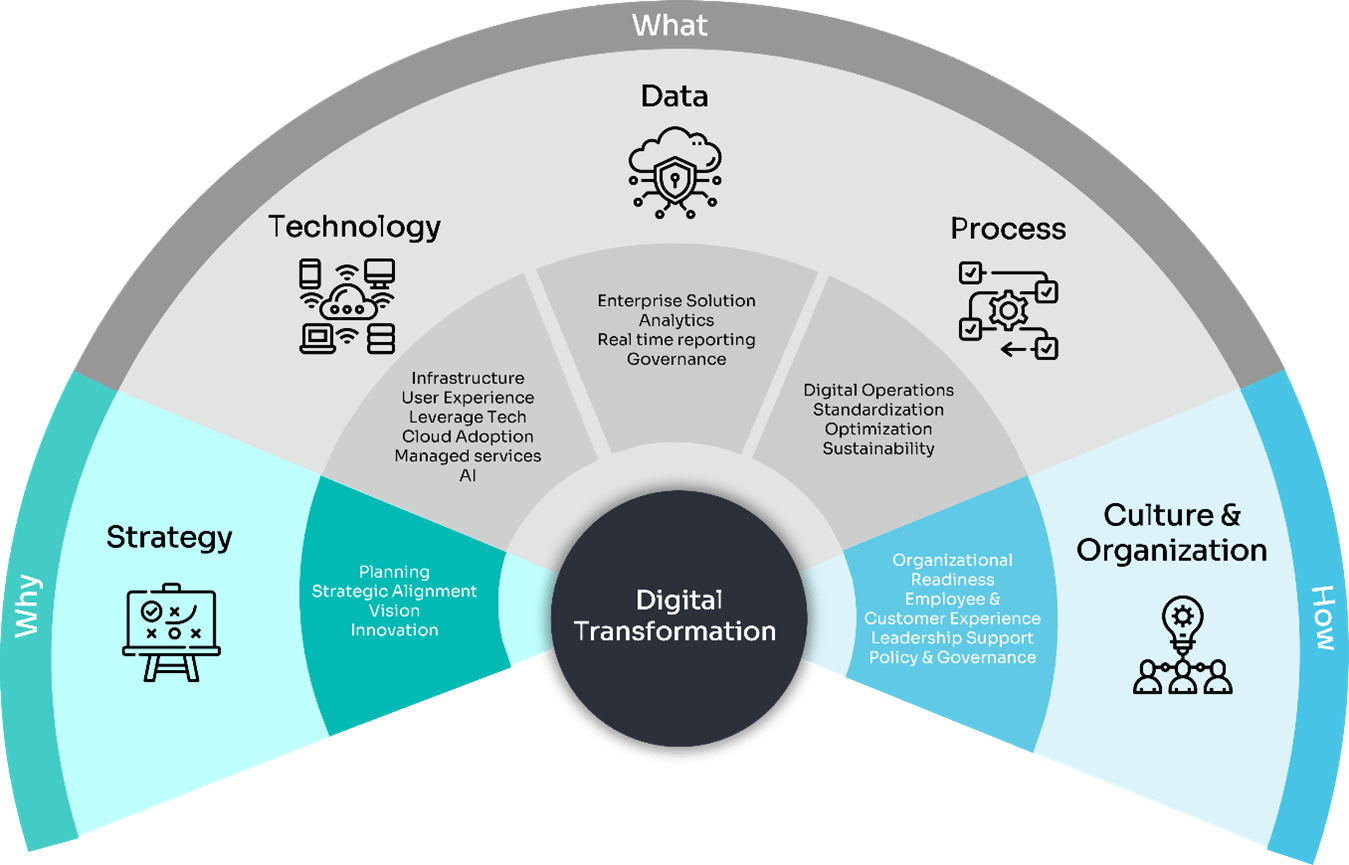
Start achieving your digital strategy: Develop a road map to enable success
Maturing businesses regularly need to revisit their strategies for bringing new digital capabilities and technologies into their operations to stay on top of an increasingly competitive landscape. Organizations and entire business models are being rendered obsolete by disruptive innovations, and these forces will not wait for your organization to react.
To be on the right side of disruption, organizations should proactively seek opportunities for technology to help implement new business models, deliver new products, expand revenue, amplify operational efficiencies, enhance customer and employee experiences and continue to compete in the digital landscape.
How does a strategic assessment work?
Digital transformation empowers your organization to build digital competency and capabilities across the organization. Our strategic assessment and road map development framework is designed to aid your organization in growing the core aspects of digital maturity while helping to define a tailored path to get ahead in our ever-changing digital world.
Strategic assessment and road map development is an essential component of a successful digital transformation initiative as it provides a clear and structured framework to align technological initiatives with business goals, anticipate potential challenges and ensure a coordinated and phased approach, increasing the chances of delivering sustainable organizational growth in the digital age.
Our structured and tested approach for strategic assessments and road map development is based on 4 phases: initiation, current state, future state and road map.

Phase 1: Initiate project
Lay the foundation for a seamless project and a strong, collaborative relationship by co-developing a work plan.
The focus of this phase is to understand the executive strategy and stakeholder needs that provide context for the prioritization setting and define the project’s goals, objectives and resource roles and responsibilities. As not all project tasks can be addressed simultaneously and don’t carry equal importance, the prioritization setting is necessary to sift through the choices and establish a logical priority that aligns with your specific organizational needs.
Phase 2: Current state understanding
Understand the current state of the organization in order to prioritize future state capabilities, bring improvement opportunities to light and influence the unique change management and readiness approach necessary for your organization.
The focus of this phase is to baseline the current state of the organization from a technical, organizational and cultural perspective by facilitating discovery workshops and stakeholder analyses to understand existing current state opportunities, issues and challenges. At Baker Tilly, we highlight five digital transformation components that help organizations determine their ability to anticipate change, grow, compete and enable their customers and employees in new ways – strategy, technology, data, process, and culture and organization.

Each component consists of sub-categories that help outline the capabilities needed for organizations to undertake a successful digital transformation. As an organization progresses through these components and along a digital maturity scale, they have a better gauge on their level of digital competence and ability to determine where value opportunities exist. This supports organizations in establishing the capacity to self-sustain further digital transformation and innovation down the line.
Phase 3: Future state visioning and prioritization
Define the desired future state capabilities and understand what is required (and what isn’t) to support the organization.
The focus of this phase is to work with you to define the capabilities and initiatives (people, process and technology) needed to build the desired future state road map. Through design thinking and innovation sessions, we work with you to envision a new way of working, not mired in how work gets done today. In addition, our team conducts a benefits and risk evaluation to enable capability prioritization and relative value for the road map.
Phase 4: Implementation road map
Develop an implementation road map considering key capabilities and leveraging prior learnings.
The focus of this phase is to facilitate planning sessions to define scope, phasing options and resource considerations for key initiatives on the implementation road map. These conversations will lead to the inventory of the recommended operating model, business case, change management approach and executive summary with the road map of key initiatives and timeline defined.
Ready to get started?
Whether you already started a digital transformation initiative or are trying to decide what comes next for your organization, Baker Tilly's digital team is ready to jump in and support you at any stage. Digital transformation is not a “one-size fits all;” our customized approach tailored to your vision and needs will unlock innovation and new business results to drive your organization forward.
For more information about Baker Tilly’s strategic assessment and road maps services, or to discuss how we may be able to assist your organization, contact us.
